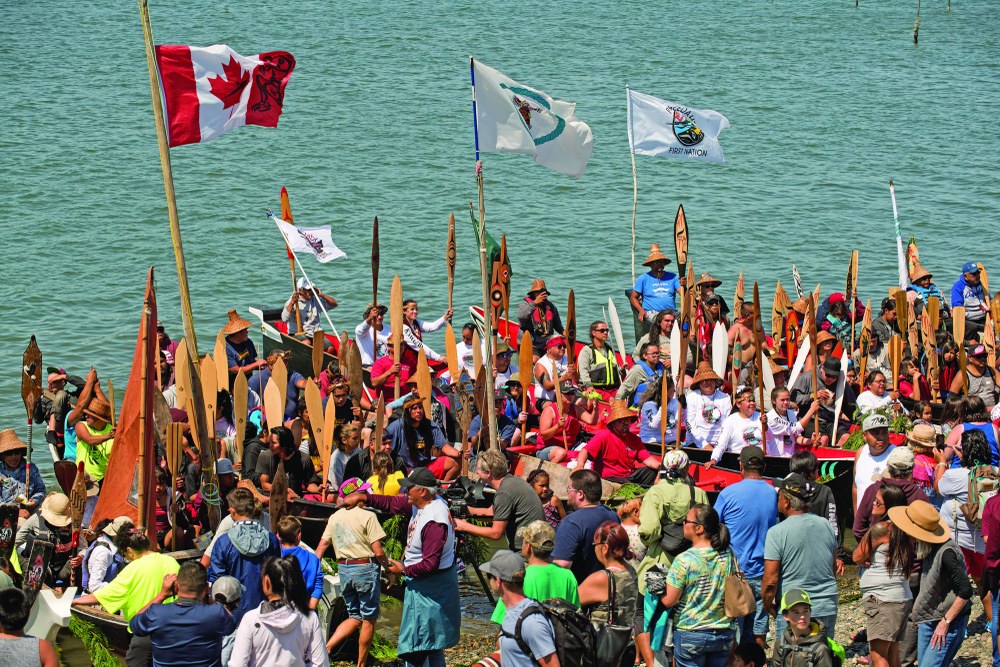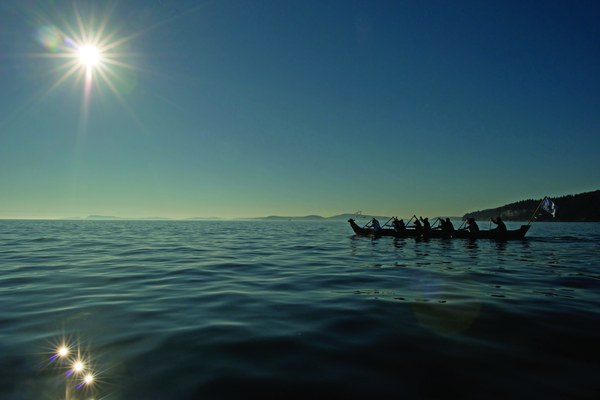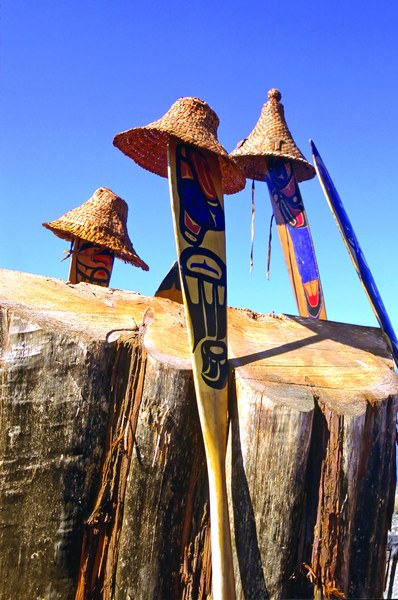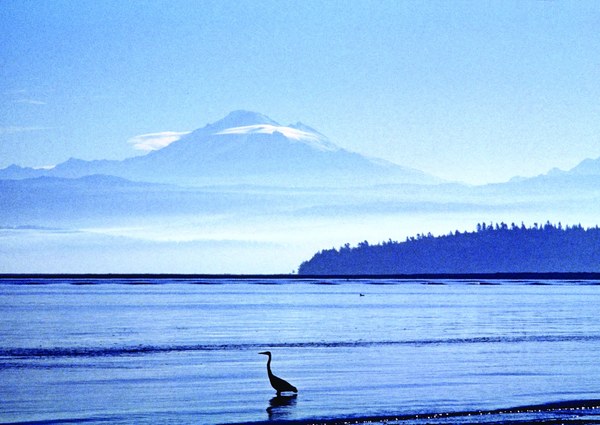
Mountaineers programs occur on the traditional lands and waters of the Pacific Northwest Indian tribes. As we continue to grow our practice of land acknowledgment, we must also honor the histories, stories, and wisdom of the Indigenous peoples who have been living here since time immemorial. We’re partnering with Sacred Lands Conservancy, an Indigenous-led non-profit with strong ties to the Lummi Nation, to produce a series of educational pieces on the importance of mindful recreation and how we can develop deeper connections to the histories of our natural places.
Tah-Mahs Ellie Kinley is a Lhaq’temish fisherwoman, an enrolled Lummi Nation tribal member, an elected member of Lummi Nation’s Fisheries and Natural Resource Commission, and President of the Sacred Lands Conservancy (SLC). I hope you enjoy this piece from her, written in collaboration with SLC’s Julie Trimingham, on how we can all work together and take action beyond land acknowledgment. Thank you for being on this important journey with us.
- Conor Marshall, Advocacy & Engagement Manager
The Mountaineers acknowledge that we are on the lands of the Pacific Northwest Indian tribes, who live here and steward these lands and waters as they have since time immemorial. As we pursue our mission, we strive to listen to and amplify Native traditions and values through respectful engagement.
Words can be powerful. When long-ignored truths are finally
spoken, healing can begin. Words can also be just words: lip
service, good thoughts, and intentions that never find their
way into action.
Written and spoken statements that acknowledge the peoples
who have always lived on and with the land are becoming
increasingly common. These land acknowledgments can feel
good to hear and to read; they are a good start to this healing
journey. How might the words of a land acknowledgment move
through our minds to our hearts and into our hands and feet?
How might we begin to take action, to start walking the walk?
We must start with understanding the land itself, the territory
that is being acknowledged, the lands and waters from which
the first peoples came.
Everything is filled with spirit
Like other Coast Salish cultures, the Lhaq’temish people of
Lummi Nation have an oral tradition. We learn what we know
from songs, from stories, from our elders telling us things.
And so, it is said that when Europeans first sailed into the Salish Sea, they couldn’t see the land through the trees, meaning the trees were so large, the forests so dense, that the earth upon which they grew was obscured. It is said that you could walk across a river on the backs of salmon, there were so many. We still say, “When the tide is out, the table is set” because crab, oysters, clams, and all manner of shellfish can be harvested. Our foods, our medicines, our materials for our clothing and shelter, were all there in the forests, the rivers, the sea. In our language there is no word for famine. Our ancestors lived in a land of abundance and generosity.
 lummi paddlers crossing waters south of lummi island.
lummi paddlers crossing waters south of lummi island.
As with other Indigenous peoples, our ancestors listened to
the lands and the waters and learned how to be here. Some
people call this knowledge and these practices the original
instructions, or ancestral teachings, or Indigenous wisdom.
Creator, ancestors, the plants and animals, the lands and
waters, the place itself: these are the source of our knowledge
and traditional lifeways that have been handed down from
generation to generation since time immemorial.
Our ancestors understood that everything is alive, everything
is filled with spirit, and we are all Mother Earth’s children. They knew that humans were the youngest (most pitiable!) siblings in the family, and that we lacked the gifts of wings, of fins, of claws, of fangs, of fur, of speed, that our older siblings had. Our ancestors knew that we humans relied on the generosity of the cedar trees, the salmon, the medicine plants. This is why, when we harvest something, we always say hy’shqe
(thank you).
There’s a deep strand of common sense in Indigenous wisdom.
Our ancestors understood that if they harvested everything
one year, the next year there would be nothing. Never take the
first nor the last; only take what you need. For instance, our fishing technologies were designed to always let some fish go,
to ensure the future generations of fish.
Because our ancestors understood that they were part of
a family, they were in relationship with this place, with all
the plants, animals, earth, water, and sky. Healthy family
relationships are not transactional; they are understanding,
loving, and reciprocal. We take care of the earth that gives us
life and takes care of us.
Since time immemorial, generation after generation, our
people have fished, hunted, gathered together, laughed, held
ceremony, and lived life in all its fullness on and around the
archipelago now known as the San Juan and Gulf Islands (in
the US and Canada, respectively). To acknowledge Native land
is to acknowledge that this place is filled with the spirits of our
ancestors, of our beloved family members. To acknowledge
Native land is also to acknowledge that Native peoples are
still here.
 Paddles and hats. several paddlers left their paddles and cedar bark hats near an old western red cedar stump. from the paddle to lummi 2007.
Paddles and hats. several paddlers left their paddles and cedar bark hats near an old western red cedar stump. from the paddle to lummi 2007.
We are all treaty people
There are hundreds of thousands of Native and First Nations
people living in the Pacific Northwest. In Washington state, many of us live on reservations that were created by treaties signed between Native peoples and the United States government.
The treaties were an attempt to secure land for settlement by
non-Natives without engaging in costly warfare. Tribes that
signed the treaties were promised reservation lands and various
benefits. Further, the treaties protected the tribes’ rights to
hunt, gather, and fish in usual and accustomed territories “for
as long as the mountains stand and the river runs."
It is widely accepted that treaties are to be enforced in the
way that the signatories understood them. When the treaties
were signed, the rivers ran free, salmon were abundant, the
Southern Resident Killer Whales numbered in the hundreds,
the forests were thick, the air was clean – the Salish Sea was
alive and healthy. The treaties guarantee our rights to exist,
hold ceremony, hunt, gather, and fish in such abundance.
When you say the words of a land acknowledgment, you are
saying those words on treaty territory. If you are not Native,
your right to be here rests on the treaty, and on upholding
the treaty. We are all treaty people. Our collective treaty
obligation is to protect Native rights to fish, hunt, and gather,
which means we must restore the natural abundance and
vitality that were present at the signing of the treaty.
A teaching: the story of Salmon Woman
Like many peoples whose traditional lifeways are centered on
salmon, Lummi holds a ceremony every spring to celebrate
and give thanks for the return of the salmon. Every year, the
story of Salmon Woman is told.
The story tells how, when Salmon Woman saw that the
human people were starving, she sent her children to feed them. The humans thrived, eating the salmon, but then they
began to take the salmon for granted. Salmon Woman called
her children back to her. The people starved again. Salmon
Woman again took pity, sent her children to feed the humans,
but this time with a warning: if her children were ever abused
or neglected or unappreciated again, she would take her
children away forever.
Some salmon runs have already gone extinct, and many others
are struggling. We have taken Salmon Woman’s children
for granted; we have not taken good care of the Salish Sea,
the rivers, the air, the forests, and so now Salmon Woman is
calling her children back to her. As the salmon struggle, so do
Native peoples and the killer whales who depend on salmon. If
the Salish Sea and all its rivers cannot support salmon, killer
whales, and Native peoples, soon it will not be able to support
others who live here as well.
How do we show Salmon Woman that we are listening?
In our First Salmon ceremony, the first harvested salmon of
the season is shared amongst all attendees (the gathering
is large, so the portions are very small). After the meal, the
salmon’s bones are collected, and then ceremonially given
back to the sea. This is an act of acknowledgment, of thanks,
of honoring.
Acknowledging that you stand on Native land is the first step
in honoring the land. You honor the land by opening your
heart and mind, and then by taking action.
 Winter sunrise on mt. baker, taken from lummi island.
Winter sunrise on mt. baker, taken from lummi island.
Ways to Take Action Beyond Land Acknowledgment
As you live, work, and recreate on the lands and waters of the Pacific Northwest Indian tribes, here are some ways you can take action beyond land acknowledgment toward a healthy, thriving Salish Sea.
Practice gratitude, generosity, and humility
As you recreate and enjoy these lands, know yourself to be part of the ecosystem, not a visitor to it. Go beyond “Leave No Trace” and into deep witnessing. Ask yourself “how are the lands/waters/other living things doing?” Take care of the land as you would a beloved. When you honor the land, you honor its people.
See place, not borders
Start to see how geography, climate, culture, Indigenous languages, and kinship ties – rather than geopolitical borders – define a place. There are no fixed boundaries defining a spiritual, cultural, and physical ecosystem. Territories overlap, but there is a sense of wholeness.
Learn the names & history of the places where you live, work, and recreate
Some names share good information and deeper meaning about a place. For instance, the place name Olalla (in what is now known as Kitsap County) is a variant of a Salishan word meaning berries, because Saskatoon berries grew there in abundance. On San Juan Island, Deadman’s Bay is just below Smallpox Bay. Why? When smallpox was ravaging Native peoples on the island, they’d wade into the water to cool their fevers in one bay (Smallpox) and then their bodies would wash ashore at another (Deadman’s).
Work to restore wild salmon runs
We can all help restore our region’s wild salmon runs through small gestures like avoiding farmed (Atlantic) salmon, and larger actions like supporting the Indigenous-led call to breach the four lower Snake River dams.
Read works from Indigenous writers
Robin Wall Kimmerer’s Braiding Sweetgrass and Tyson Yunkaporta’s Sand Talk are excellent introductions to basic Indigenous principles. Local Indigenous writers with books of fiction, non-fiction, memoir, or poetry include Sherman Alexie, Rena Priest, Sasha LaPointe, and Charlotte Coté.
Learn more about Indigenous culture by
visiting a museum, attending a community
event, or watching local Indigenous films. Here are some to consider:
•The Tulalip Tribes’ Hibulb Cultural Center
•The Suquamish Museum
•The Burke Museum, which works with Pacific Northwest Coast communities and artists to share culture in a good way
•The annual Indigenous Canoe Journey, which brings canoe families from near and far to paddle through the Salish Sea. Landings during which welcome protocols are followed are typically open to the public
•The annual Gathering of the Eagles Canoe Journey and potlatch, which brings regional canoe families together to paddle through the San Juan Islands during Memorial Day weekend. Landings with traditional protocols are hosted by local island communities and are open to the public, as is the final landing at Lummi Nation
•The Lummi Nation’s annual Stommish Water Festival
•The Makah Tribe’s annual Makah Days celebration
•Children of the Setting Sun Productions is a Lummi production company with films on treaty rights, salmon, and other issues
Teach your family the full history
Places hold the past as well as the present. Acknowledging that these lands are Native lands means acknowledging history. There is power in knowing the truth, in knowing what kinds of actions lead to suffering as well as to joy. Teach children without guilt or shame, but also let them know the true and full history of these places. Let your children know that Indigenous peoples have always lived here, and that there are good, life-sustaining ways to live here. Teach them that they belong to a place but the place does not belong to them. Teach them to be grateful and generous and full of love for this place and for one another.
Support Indigenous calls to action, policies, businesses, non-profit organizations, and institutions
Ancestral wisdom of Indigenous peoples can show us ways to get back into a right, reciprocal relationship with Mother Earth. Supporting the people who carry these teachings, and the causes they advocate for, are ways to help protect and share ancestral wisdom. We all rise when we lift up each other.
This article originally appeared in our fall 2023 issue of Mountaineer magazine. To view the original article in magazine form and read more stories from our publication, visit our magazine archive. You can read more from Tah-Mahs Ellie Kinley and Sacred Lands Conservancy in their blog post, This Land: An Indigenous Perspective on Land Acknowledgment.
Add a comment
Log in to add comments.thank you
 Sacred Lands Conservancy with Tah-Mahs Ellie Kinley
Sacred Lands Conservancy with Tah-Mahs Ellie Kinley